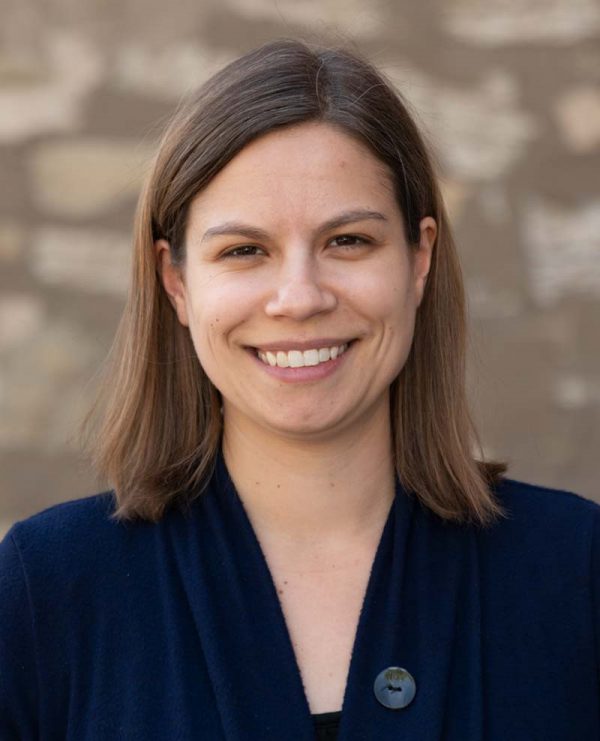
Environmental Working Group, where she serves as
a leading national expert on agricultural conservation
and how it affects the climate crisis.
A Kalamazoo College alumna is hoping you’ll think about where your food comes from this Thursday, April 7, which serves as World Health Day.
Anne Schechinger ’10 was recently promoted to Midwest director at the Environmental Working Group (EWG), a nonprofit organization that specializes in research and advocacy in agricultural subsidies, toxic chemicals, drinking-water pollutants and consumer products. EWG’s annual Dirty Dozen list describes pesticides that have been associated with adverse health impacts including some that have been restricted in certain countries; its databases allow consumers to look up what chemicals are in their cleaning products, personal care and beauty supplies, food and specific region’s drinking water; and its quick tips allow consumers to learn about reducing their climate footprint through what they eat.
Within that, Schechinger—an economics major in her time at K—explores agriculture’s impact on the environment while analyzing how government policies could reduce agricultural pollution. She leads a team of three while serving as a leading national expert on farm subsidies, nitrate pollution in tap water, toxic algae blooms, and federal policies related to agricultural conservation and how they affect the climate crisis among other topics. She regularly is a subject-matter expert for the news media, interviewing with outlets such as the Los Angeles Times, NPR, Bloomberg and the Guardian.
“At EWG, I work with a lot of smart, knowledgeable people and we’re tasked with becoming experts on new things every year,” Schechinger said. “K has helped instill that love of lifelong learning in me, which has helped my career. A liberal arts education has helped me think critically, and a big part of my job is to come up with unique solutions to problems.”
World Health Day, established by the World Health Organization (WHO), features a different focus each year. This year, it’s the growing climate crisis, making Schechinger’s expertise especially relatable.
“World Health Day is important because it brings public health to the forefront of our minds and the climate crisis should be a part of that thinking,” she said.
WHO estimates that more than 13 million deaths around the world each year are attributable to avoidable environmental causes. Plus, the climate crisis is the single biggest health threat facing humanity as more than 90 percent of all people breathe unhealthful air thanks largely to the burning of fossil fuels. Agriculture is responsible for at least 10 percent of greenhouse gas emissions in the U.S., Schechinger said, and the federal government’s current Farm Bill isn’t doing enough to help farmers reduce their impact on the environment.
“There are agricultural conservation programs within the current Farm Bill that pay farmers to do certain things that we hope would be good for the environment and public health,” she said. “But many of them are structural practices like animal waste lagoons for concentrated animal feeding operations. We’re really focusing in this next Farm Bill on getting more funding to the conservation practices that actually help the environment and help farmers mitigate and adapt to climate change.”
WHO says breaking cycles of destruction for the planet and human health requires legislative action, corporate reform and individuals to be supported and incentivized to make healthful choices. Schechinger wants to be a part of that as an agricultural expert in her career and wants you to think about how these policies affect your daily life.
“Agriculture affects everyone, even if you don’t live next to a farmer’s field,” Schechinger said. “I did a report last year about nitrates in drinking water, and with how watersheds work, you can live pretty far from agriculture and still have agricultural contaminants in your drinking water. We found that Los Angeles, San Francisco and major cities across the U.S. have nitrates in their drinking water from agriculture because it’s easy for pollution to get into a river or stream, and then flow many miles downstream into your drinking water. We need to be reminded of these issues because I think we can get bogged down in what we hear just with how much greenhouse gas emissions are growing. But at the end of the day, climate change affects people. It affects all of us. It affects our health and our lives.”

